What is astrology? A guide to zodiac signs, planets and horoscopes
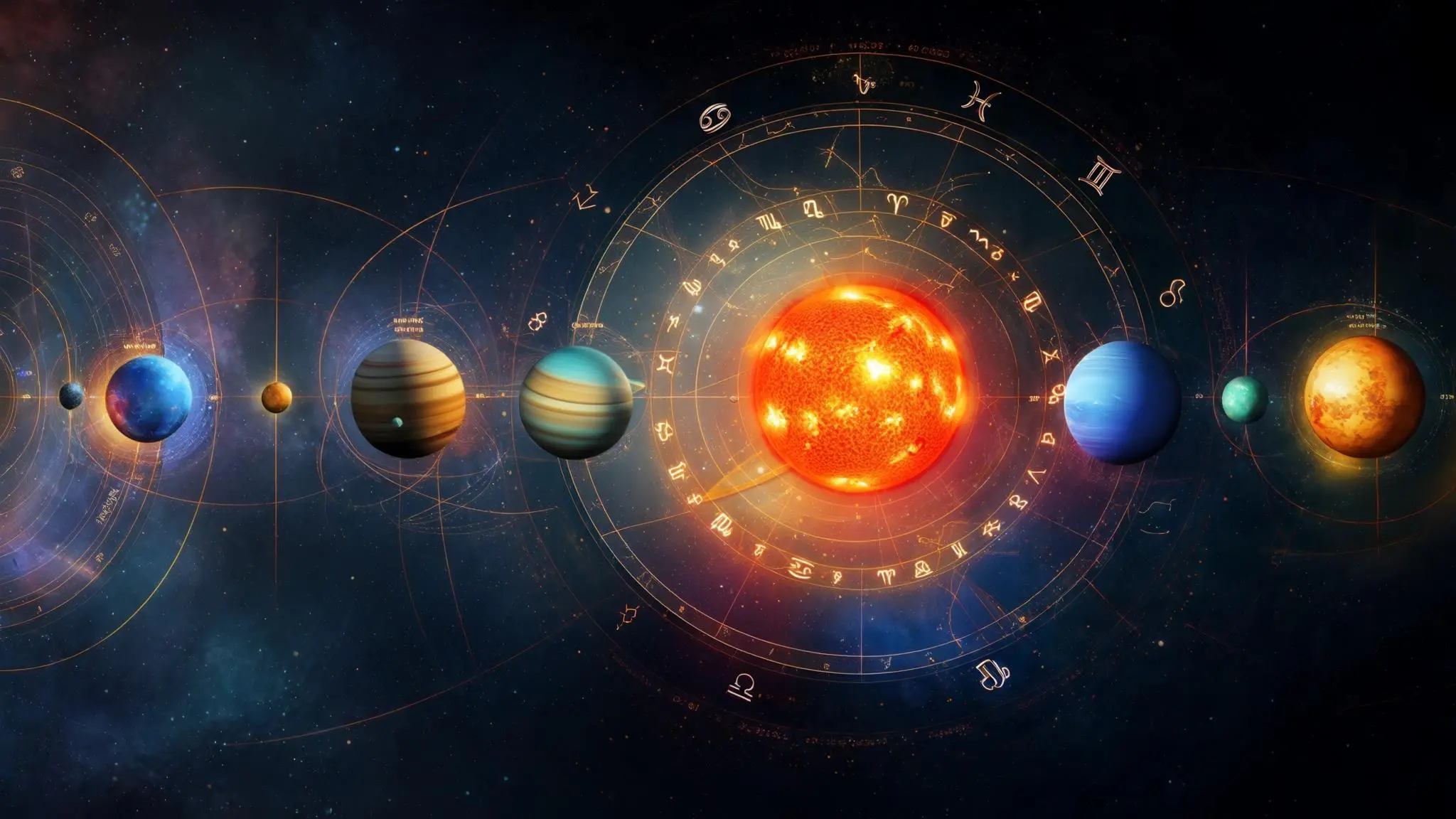
Astrology is a tradition that dates back thousands of years and is based on the idea that the movements of the heavenly bodies affect people's lives and personalities. By analyzing the positions of the planets at a person's birth, astrologers can create horoscopes that are said to provide insights into an individual's characteristics, relationships and life path.
Today, astrology is mainly used for personal development, self-awareness and understanding life cycles. Many people follow their daily horoscopes, while others delve into more advanced astrological analysis such as birth charts and planetary transits.
This guide covers the basics of astrology, the difference between astrology and astronomy, the 12 zodiac signs, Chinese astrology and how the planets are said to affect our lives.
Curious to understand astrology in depth? Read on to discover how this ancient tradition is still used today.
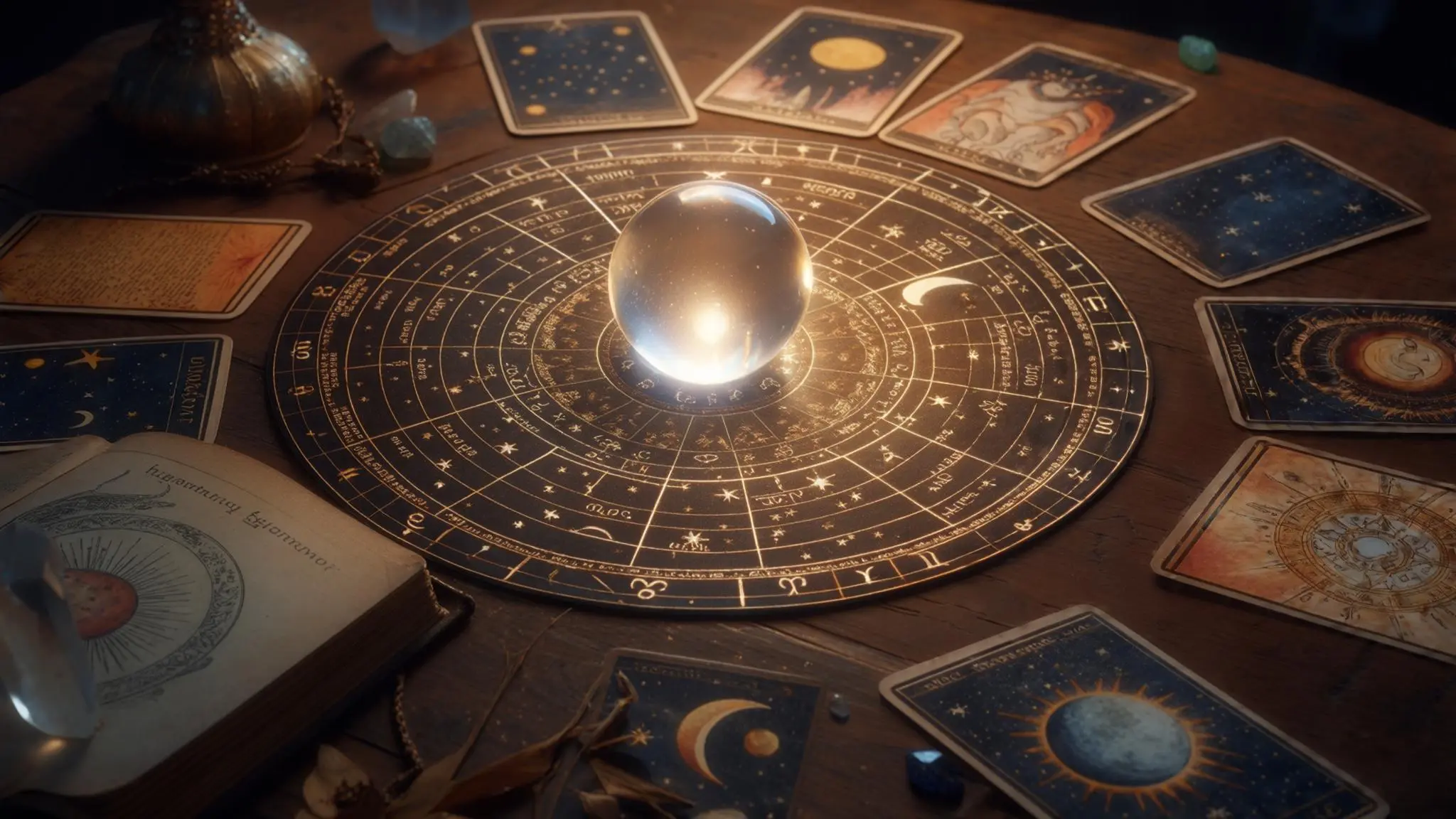
The difference between astrology and astronomy
Astrology and astronomy share common roots, but they are two completely different disciplines. While astronomy is a science that studies the celestial bodies and the physical laws of the universe, astrology is a spiritual and symbolic tradition that interprets how these celestial bodies affect human life.
Astrology - a spiritual and symbolic tradition
Astrology is based on the idea that the positions of the planets and stars at a given time influence human characteristics, relationships and life events. It has been used for thousands of years in different cultures and today is mainly used in personal development and self-awareness.
Astronomy - a natural science
Astronomy is a scientific discipline that studies the universe through observation and mathematical calculations. Astronomers study stars, planets, galaxies and other celestial bodies using telescopes, space probes and the laws of physics.
Why are astrology and astronomy often confused?
In the past, astrology and astronomy were one and the same discipline. In ancient times, the stars were used both to navigate and to interpret the future. It was not until the 17th century, when the scientific method began to take shape, that astronomy was separated from astrology.
Today, astronomy is a recognized science, while astrology is considered a metaphysical belief with no scientific basis. Despite this, astrology has continued to fascinate and inspire people around the world.
Want to know more about the basics of astrology? Keep reading to understand how astrology works and how it is used today.
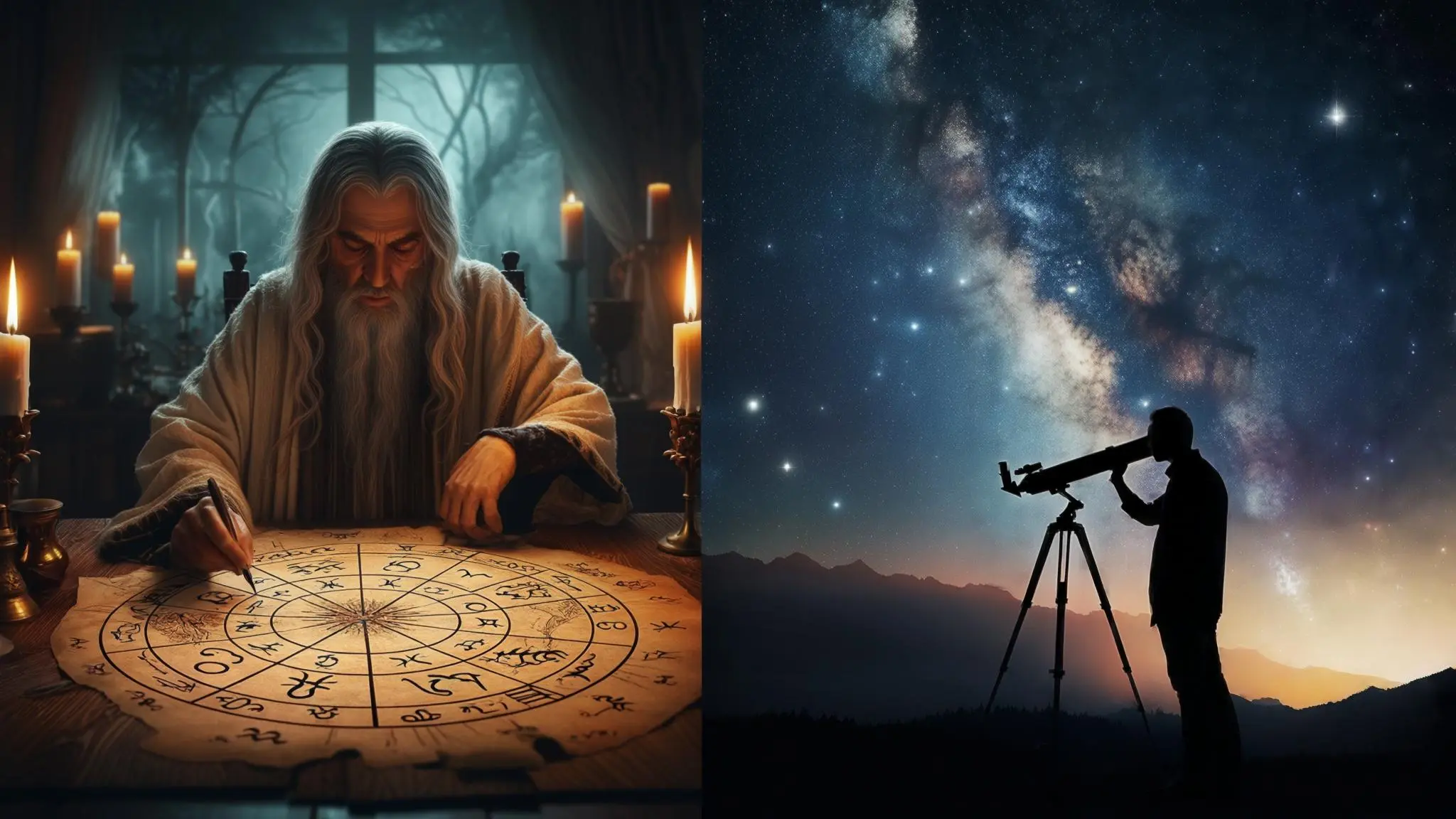
How does astrology work?
Astrology is based on the idea that the positions of the heavenly bodies at a given time can influence people's personalities, behaviors and life events. By analyzing the position of the stars and planets in relation to the Earth, astrologers create horoscopes that are said to provide insights into an individual's characteristics and future possibilities.
The three pillars of astrology
To understand astrology, you need to know its three basic elements:
- Sign of the zodiac: The 12 zodiac signs based on the position of the sun at your birth.
- Planets: Each planet is considered to have a unique energy that affects different aspects of life.
- House: An astrological birth chart is divided into 12 houses, with each house representing different areas of life such as career, relationships and personal development.
What is a birth chart?
A natal chart is a map of the sky at the exact time and place of a person's birth. It shows where the sun, moon and planets were in relation to the Earth. By interpreting these positions, astrologers can draw conclusions about a person's personality, strengths, challenges and life path.
Planets and their importance
In astrology, the planets play a central role, and each planet is said to influence different aspects of a person's life:
- The sun: Represents identity and life energy.
- The moon: Control emotions and intuition.
- Mercury: Linked to communication and mindset.
- Venus: Associated with love, beauty and harmony.
- March: Symbolizes drive, passion and energy.
- Jupiter: Associated with luck, growth and wisdom.
- Saturn: Represents discipline, responsibility and challenges.
- Uranus: Stands for change, freedom and innovation.
- Neptune: Connects to dreams, intuition and spirituality.
- Pluto: Represents transformation, power and renewal.
How is astrology used today?
Astrology is used in different ways depending on the individual's interest and beliefs. The most common applications include:
- Daily horoscopes: Short interpretations based on the position of the Sun for each zodiac sign.
- Birth horoscope: An in-depth analysis of an individual's personal characteristics and life path.
- Transit: Studies of how current planetary positions affect a person at a given time.
- Synastry: Comparisons between two people's horoscopes to analyze relationships and compatibility.
Want to know more about how astrology affects your life? Keep reading to explore the 12 zodiac signs and their meanings.
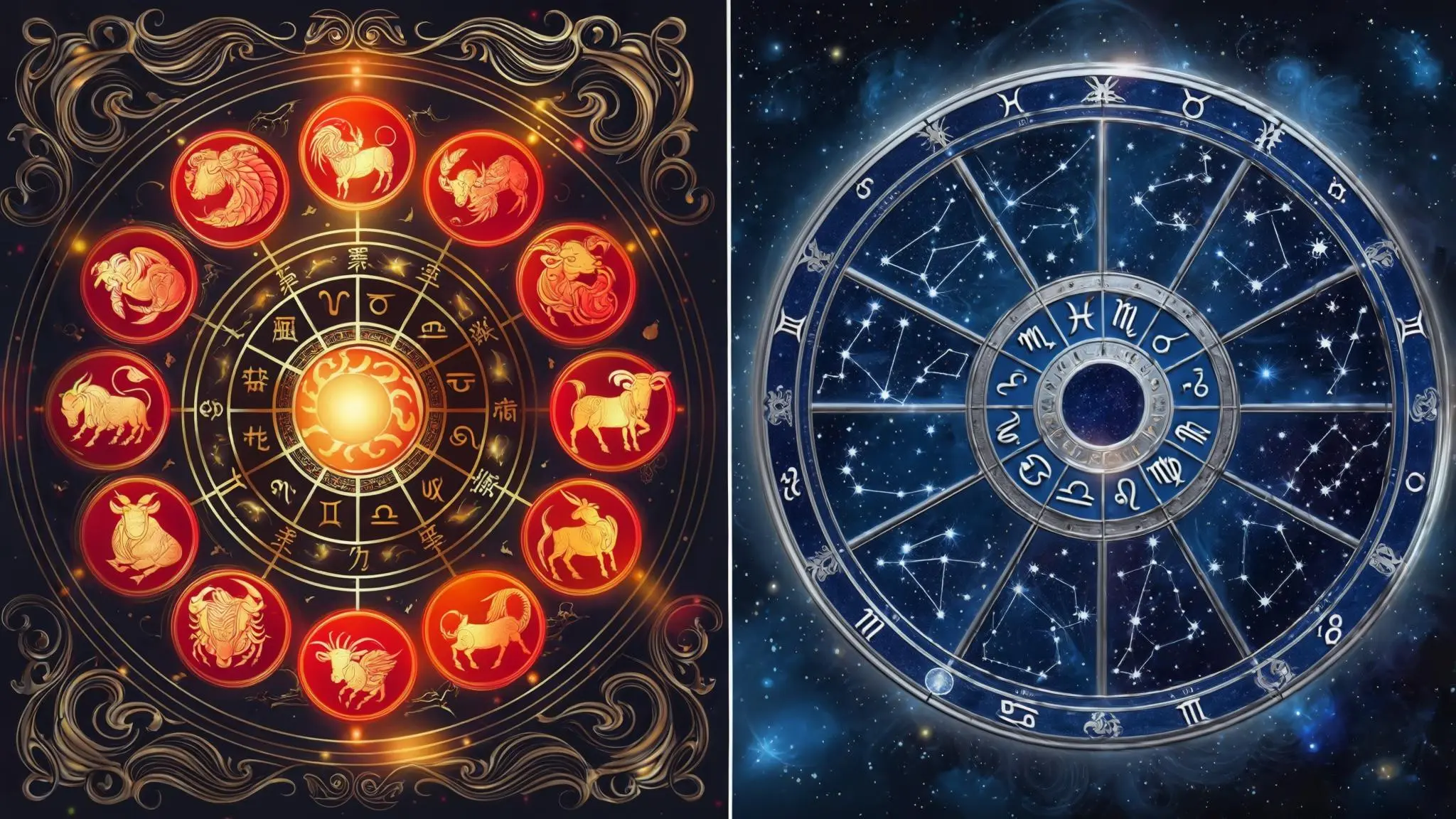
Zodiac signs and astrology basics
The 12 zodiac signs form the basis of Western astrology and are based on the position of the Sun at your birth. Each sign has its own unique characteristics and is influenced by its ruling planet and element.
The 12 zodiac signs and their characteristics
| Sign of the zodiac | date | element | Ruling planet | Characteristics |
|---|---|---|---|---|
| Aries | March 21 - April 19 | Fire | March | Courageous, enterprising, impulsive |
| Oxen | April 20 - May 20 | Soil | Venus | Patient, stable, pleasure-loving |
| The twins | May 21 - June 20 | air | Mercury | Social, adaptable, curious |
| The crayfish | June 21 - July 22 | water | The moon | Emotional, loyal, intuitive |
| The lion | July 23 - August 22 | Fire | The sun | Charismatic, confident, generous |
| The Maiden | August 23 - September 22 | Soil | Mercury | Analytical, thorough, practical |
| The Wave | September 23 - October 22 | air | Venus | Diplomatic, charming, balanced |
| Scorpio | October 23 - November 21 | water | Pluto & Mars | Intense, passionate, mysterious |
| Sagittarius | November 22 - December 21 | Fire | Jupiter | Optimistic, adventurous, philosophical |
| Capricorn | December 22 - January 19 | Soil | Saturn | Disciplined, ambitious, responsible |
| Aquarius | January 20 - February 18 | air | Uranus & Saturn | Independent, innovative, humanitarian |
| Pisces | February 19 - March 20 | water | Neptune & Jupiter | Empathetic, dreamy, intuitive |
The role of the elements in astrology
Each zodiac sign belongs to one of the four elements - fire, earth, air or water. The elements influence how the signs express themselves and interact with the world around them:
- Fire (Aries, Leo, Sagittarius): Energetic, passionate and driven.
- Earth (Taurus, Virgo, Capricorn): Practical, stable and reliable.
- Air (Gemini, Libra, Aquarius): Intellectual, communicative and social.
- Water (Cancer, Scorpio, Pisces): Emotional, intuitive and creative.
How does your zodiac sign affect you?
The zodiac sign is said to provide a basic insight into your personality, but it is only one part of the astrological map. The moon, the ascendant and the position of the planets also play an important role in your personal astrology.
Want to learn more about your zodiac sign? Check out our article on zodiac signs and personality for a deeper analysis!
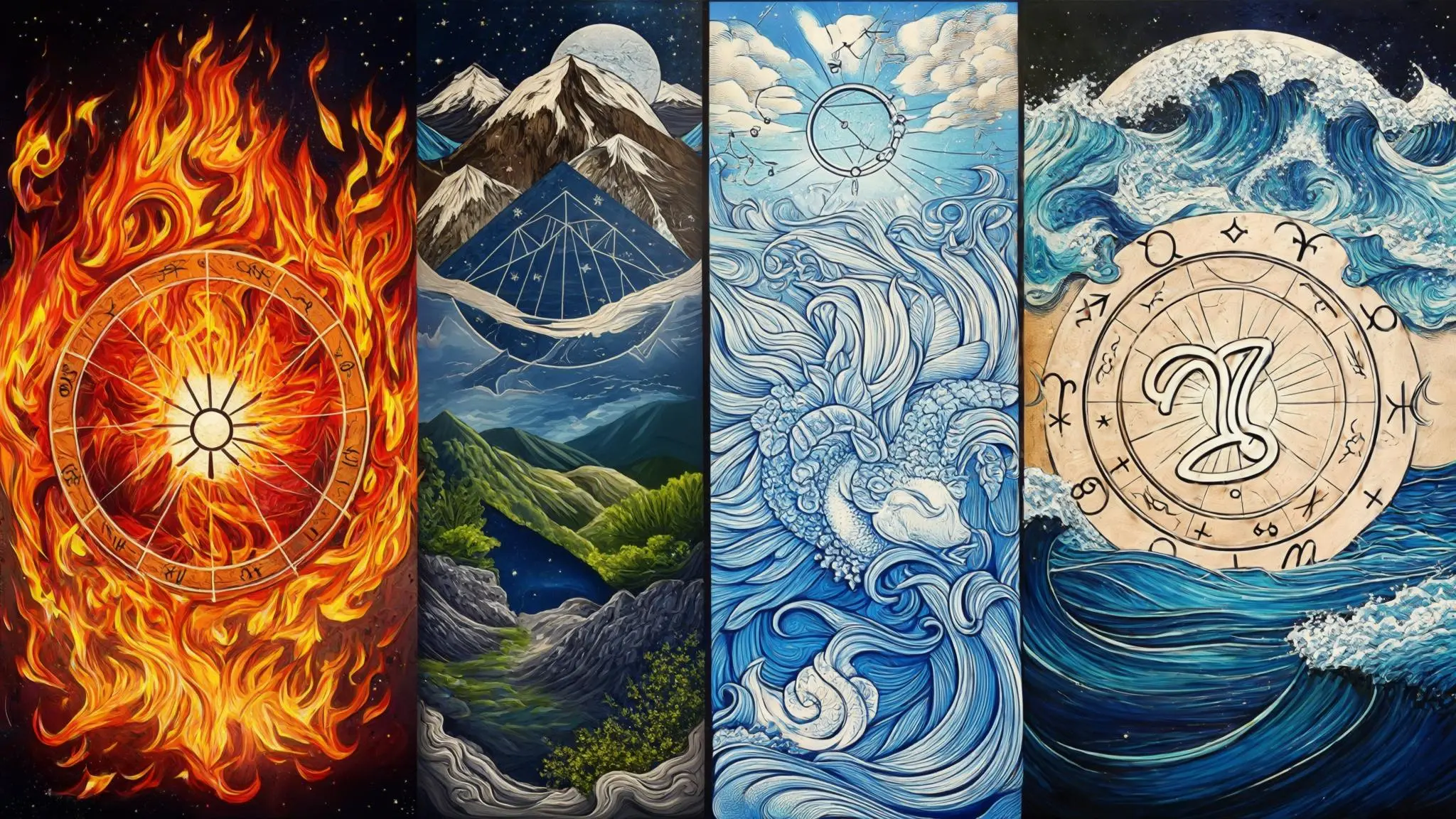
Chinese astrology vs. Western astrology
Astrology is found in many cultures, but the two best known systems are Western astrology and Chinese astrology. Both use date of birth to analyze personality and life path, but they differ in their methodology and symbolism.
What is Chinese astrology?
Chinese astrology is based on a 12-year-old bicycle, where each year is associated with one of twelve animals. The Chinese horoscope is also influenced by the five elements (wood, fire, earth, metal, water) and the yin-yang energy.
The 12 animals of Chinese astrology
| Animals | Year of birth (example) | Characteristics |
|---|---|---|
| Rat | 2020, 2008, 1996 | Smart, charming, adaptable |
| oxen | 2021, 2009, 1997 | Patient, reliable, strong |
| tiger | 2022, 2010, 1998 | Brave, energetic, charismatic |
| rabbit | 2023, 2011, 1999 | Friendly, intuitive, diplomatic |
| Drake | 2024, 2012, 2000 | Charismatic, confident, powerful |
| worm | 2025, 2013, 2001 | Wise, mysterious, determined |
| Horse | 2026, 2014, 2002 | Freedom-loving, energetic, confident |
| Goat | 2027, 2015, 2003 | Artistic, friendly, harmonious |
| Apa | 2028, 2016, 2004 | Intelligent, playful, creative |
| Rooster | 2029, 2017, 2005 | Ambitious, brave, confident |
| dog | 2030, 2018, 2006 | Loyal, honest, fair |
| Grey | 2031, 2019, 2007 | Generous, kind-hearted, optimistic |
Western astrology vs. Chinese astrology - what's the difference?
- Based on the sun vs. the moon: Western astrology is based on the position of the sun at birth, while Chinese astrology uses the Chinese lunar calendar.
- Zodiac signs vs. animals: Western signs (Aries-Fish) change every month, while Chinese animal signs change once a year.
- The role of the elements: Western astrology has four elements (fire, earth, air, water), while Chinese astrology uses five elements.
- Yin and yang: Chinese astrology has a duality between yin and yang, which is not used in Western astrology.
Which system is most accurate?
It depends on what you are looking for! Western astrology provides detailed horoscopes based on time, place and date, while Chinese astrology focuses on life cycles and long-term energy patterns. Many people combine both for a more complete picture of their personality and life path.
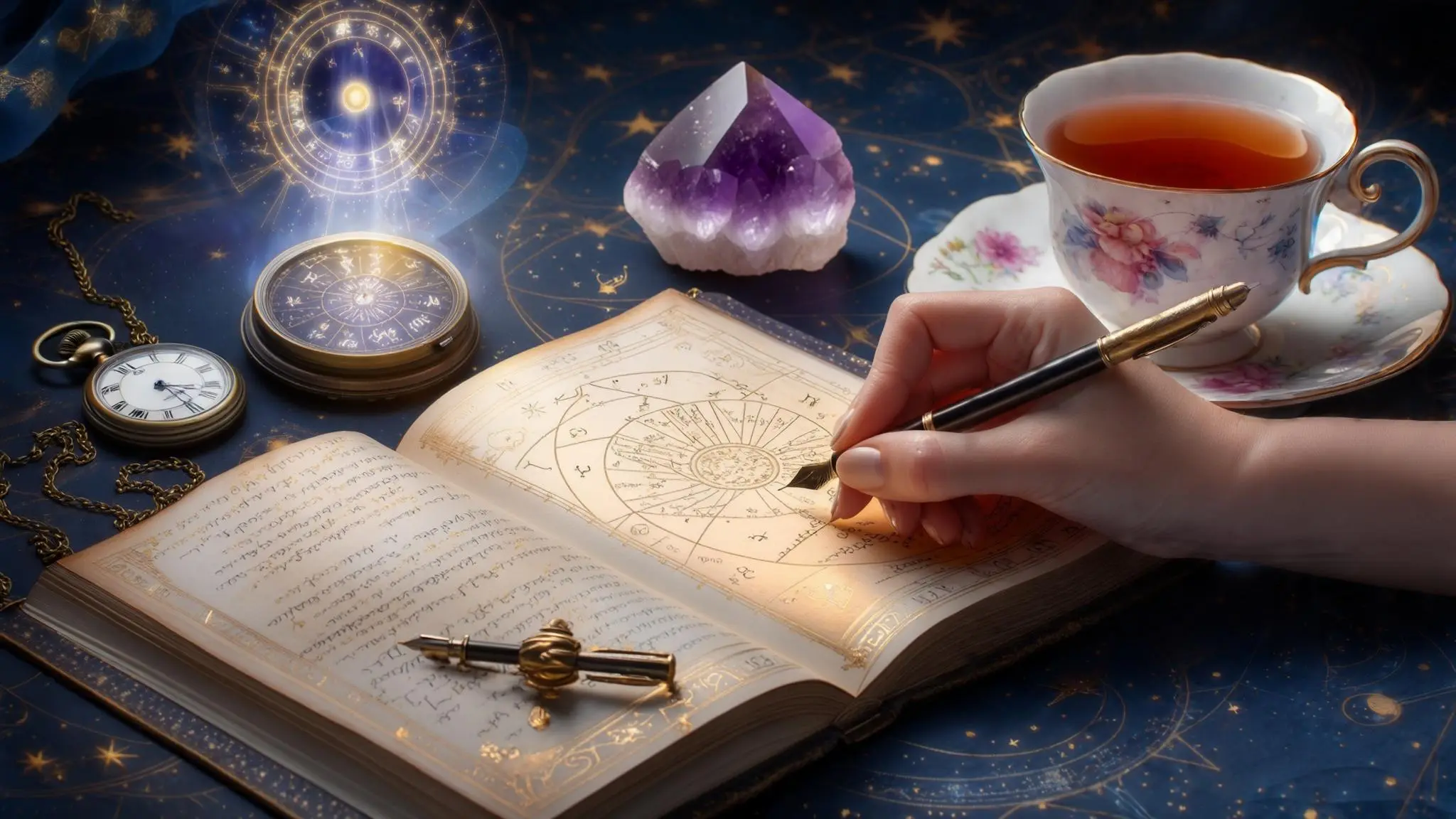
Is astrology a science?
Astrology has been around for thousands of years and has played an important role in many cultures. But is it a science? The answer depends on how you define science and what criteria you use.
What is required for something to count as science?
In modern science it is used the scientific method, which is based on:
- Observation: Collection of data through objective methods.
- Hypothesis: Testable claims that can be confirmed or refuted.
- Experiment: Reproducible tests to see if a theory holds.
- Falsifiability: To be considered scientific, a theory must be tested and disproved.
Scientific disciplines such as physics and astronomy are based on these principles. However, astrology lacks reproducible experiments that show a clear link between planetary positions and human life.
Why is astrology not considered a science?
There are several reasons why astrology does not meet the criteria of science:
- No scientific evidence: Studies have failed to show that astrological horoscopes have any predictive effect on individuals' lives.
- Subjective interpretations: Horoscopes can often be interpreted in many ways, making it difficult to measure their accuracy.
- Lack of reproducibility: If astrology were an exact science, two astrologers could draw identical conclusions from the same birth chart - but this rarely happens.
- No mechanism of impact: There is no physical explanation for how planets and zodiac signs could affect people's personality and future.
Why is astrology still popular?
Despite the lack of scientific evidence, astrology remains popular, for several reasons:
- Psychological recognition: Horoscopes often offer broad descriptions that people can relate to.
- A sense of purpose: Astrology can give people a sense of purpose and direction in life.
- Entertainment value: Many people see astrology as a fun and engaging activity rather than an absolute truth.
- Spiritual and cultural tradition: In some cultures, astrology is used as a guide to life decisions.
Astrology vs. science - can they coexist?
Although astrology is not a science in the strict sense, it serves another function in society. Many people use astrology for self-awareness and reflection, rather than for predicting the future. It can therefore coexist with science as a spiritual or psychological method of personal development.

Where are the planets right now?
The positions of the planets are constantly changing and, according to astrology, they affect our energy and our lives. Many astrologers analyze current planetary transits to understand which energies are dominant at any given time.
What is a planetary transit?
A planetary transit involves a planet moving through a particular zodiac sign or forming an angle (aspect) to another planet. These transits are considered to have an impact on both collective and individual events.
Key planetary transits to watch out for
Here are some important planets to follow and how their movements can affect us:
- The sun: Changes sign every month and affects the general energy.
- The moon: Changes signs every two days and affects our emotions and intuition.
- Mercury retrograde: May cause communication problems, misunderstandings and technical disruptions.
- Venus: Controls love, relationships and aesthetics - its movements can influence romantic experiences.
- March: Affects drive, energy and motivation - transit can either increase activity or frustration.
- Jupiter: The plane of luck and expansion, its location shows where we can grow and develop.
- Saturn: Representing responsibilities and challenges - transits can test our discipline and endurance.
- Uranus: Represents sudden change and innovation - its movements can bring unexpected insights.
- Neptune: Symbolizes dreams and illusions - its placement can influence spirituality and creativity.
- Pluto: Linked to transformation and deep change, especially in key aspects.
How can I see the current positions of the planets?
If you want to know exactly where the planets are right now, you can use online tools and astrology apps. Here are some popular resources:
- Astro.com - Free birth maps and transit analysis.
- Astro Seek - Interactive astrology tools and planetary positions.
- Mobile apps such as TimePassages and Co-Star for daily planetary transits.
How do planetary positions affect me?
To understand how today's planetary transits affect you personally, you need to compare them with your own birth chart. This is done by analyzing:
- Aspects: Do today's planets form strong angles to planets in your horoscope?
- House: Which area of life is activated by the current transits?
- Retrograde: Are any of your natal planets affected by retrograde motion?

FAQ - Frequently asked questions about astrology
What does astrology mean?
Astrology is an ancient tradition that studies the positions of the heavenly bodies and their alleged influence on people's lives, personality and future events. It is mainly used for self-awareness and guidance.
What is the difference between astrology and astronomy?
Astrology is a spiritual and symbolic tradition that interprets the influence of the stars and planets on human life, while astronomy is a science that studies the universe through observation and physical laws.
Can astrology predict the future?
Astrology does not make exact predictions about the future, but astrologers believe that planetary transits and birth charts can indicate periods of change and development.
How does a birth chart work?
A natal chart is a map of the positions of the planets at your birth and is used to analyze personality, relationships and life paths. It is unique to each individual.
How do planetary positions affect us?
According to astrology, the position of the planets affects different aspects of our lives. For example, Mercury is said to rule communication, while Venus rules love and relationships.
What is the ascendant in astrology?
The Ascendant is the zodiac sign that rose on the eastern horizon at your birth. It represents how you express yourself outwardly and how others perceive you.
What does Mercury retrograde mean?
Mercury retrograde is a period when the planet Mercury appears to move backwards in the sky. In astrology, this is considered to cause communication problems, misunderstandings and technical malfunctions.
What is the difference between Western and Chinese astrology?
Western astrology is based on the position of the sun and the 12 zodiac signs, while Chinese astrology is based on a 12-year animal cycle and the lunar calendar.
How can I find out my astrological sign?
Your sun sign is determined by your birthday. To get a more detailed astrological profile, you can calculate your birth chart using your birth time and location.
Is astrology a science?
No, astrology is not considered a science because it lacks empirical evidence and does not meet the criteria of the scientific method. However, it is used by many for spiritual and personal development.
Summary - What can astrology say about you?
Astrology is a fascinating tradition that has been studied for thousands of years and is used by people around the world to understand themselves and their environment. By analyzing the positions of the planets, astrologers can interpret personality, relationships and life events.
Although astrology is not a science by modern standards, it remains popular for self-awareness and personal development. Western astrology is based on the 12 signs of the zodiac, while Chinese astrology is based on a 12-year animal cycle.
Want to know more about your personal horoscope? Here are some ways to immerse yourself:
- Calculate your birth horoscope to see how the planets affected you at birth.
- Explore daily horoscope to see how current transits can affect your daily life.
- Learn more about zodiac signs and elements to understand your strengths and challenges.